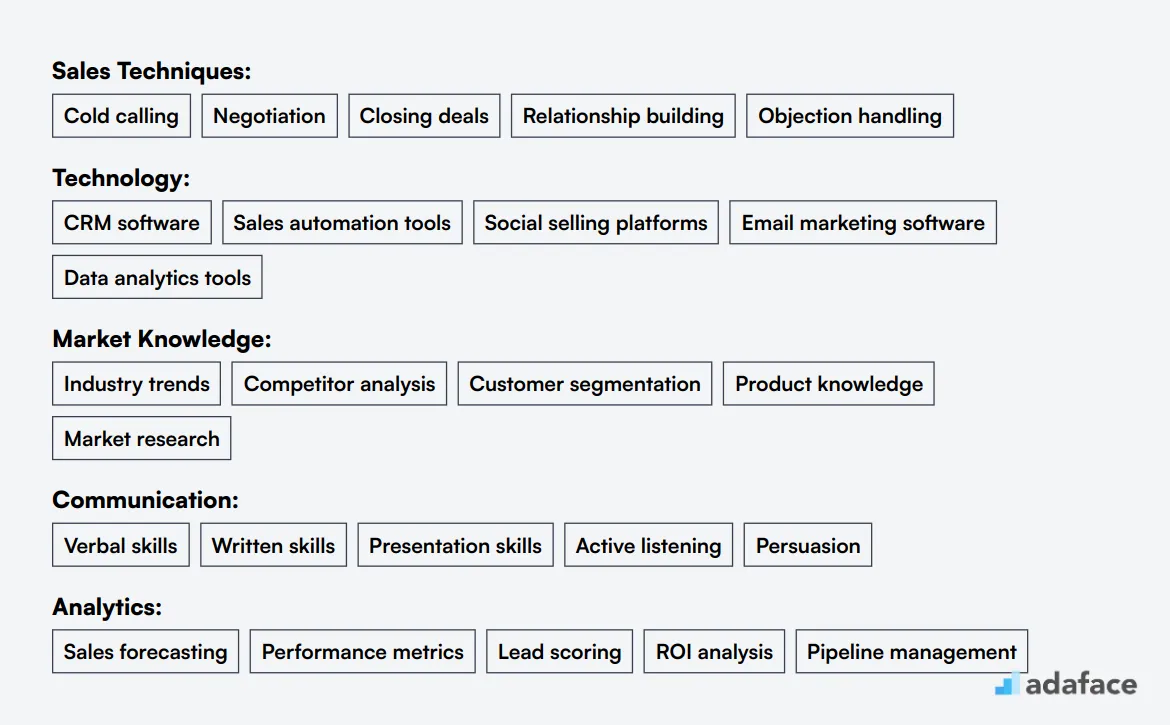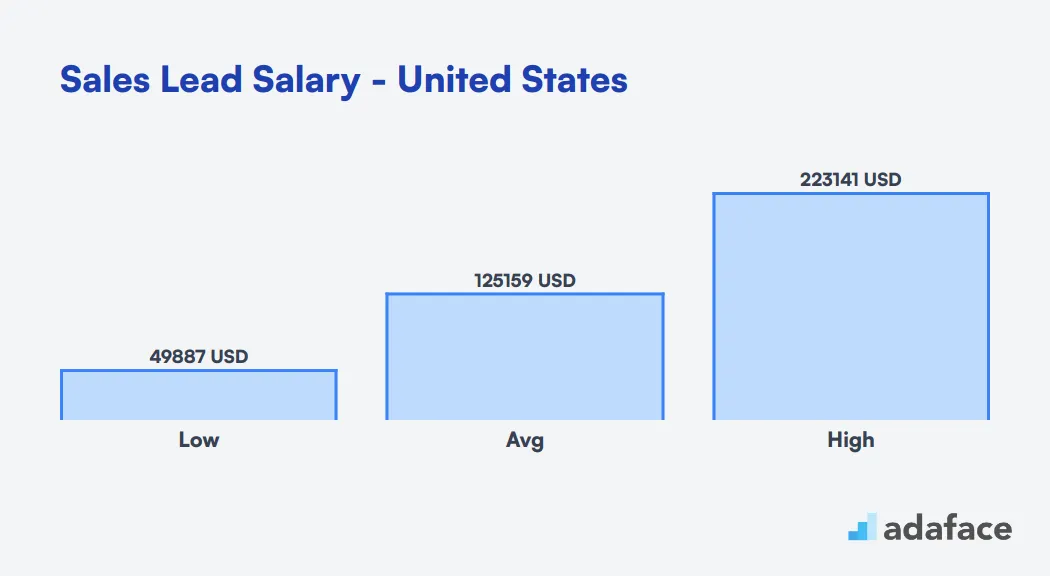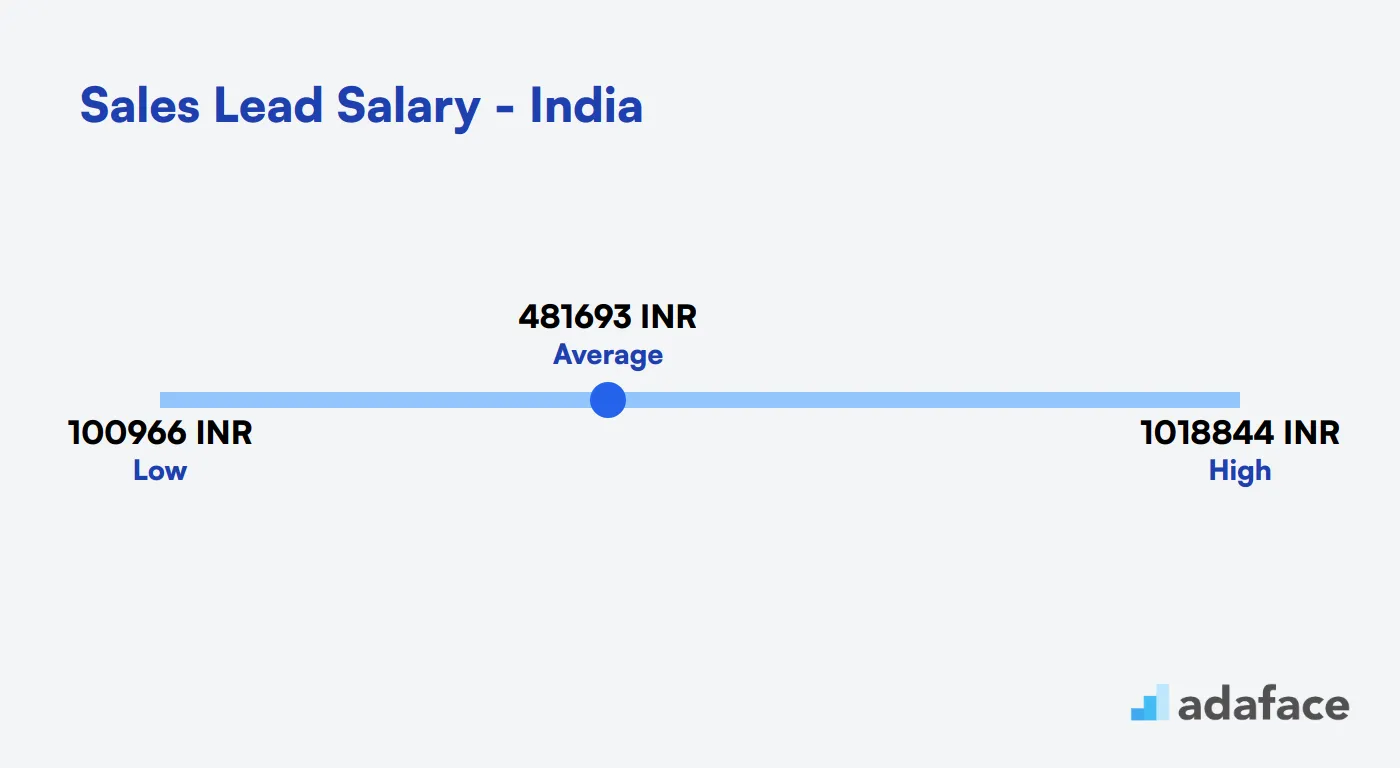As a hiring manager or recruiter, you're often tasked with finding the right candidates for pivotal roles that drive your company's success. Hiring a Sales Lead is a critical decision—one that requires a nuanced understanding of the skills and mindset necessary to excel in this role. Companies often struggle to find candidates who not only hit their revenue targets but also inspire and lead their teams towards success. It's not just about closing deals; a Sales Lead must possess strategic vision, motivational skills, and the ability to navigate complex market dynamics.
In this article, we'll explore the key responsibilities of a Sales Lead, the skills and qualifications you should prioritize, and how to draft compelling job descriptions. Discover our recommendations for skills tests and interviews from the experts at Adaface. To learn more about assessing candidates effectively, check out our Sales Aptitude Test guide.
Table of contents
What Does a Sales Lead Do?
A Sales Lead is a key player in driving revenue growth for a company. They're responsible for identifying potential customers, nurturing relationships, and guiding the sales team to close deals effectively.
The day-to-day responsibilities of a Sales Lead include:
- Developing and implementing sales strategies
- Managing and motivating the sales team
- Analyzing market trends and competitor activities
- Setting and tracking sales targets
- Conducting sales interviews and training new team members
- Building and maintaining relationships with key clients
- Collaborating with marketing to align sales efforts
- Reporting on sales performance to upper management
Identifying Key Skills and Qualifications for a Sales Lead
Hiring the right Sales Lead can be challenging, as different organizations have unique needs that influence the ideal candidate profile. What might be a non-negotiable requirement for one company could merely be a nice-to-have for another. It's crucial to clearly distinguish between required and preferred skills to streamline your hiring process.
To assist you in building a solid candidate profile, here’s a breakdown of essential skills and qualifications to consider. Below, you'll find a list separating the required skills necessary for the role and preferred qualifications that could give candidates an edge.
| Required skills and qualifications | Preferred skills and qualifications |
|---|---|
| Bachelor's degree in Business, Marketing, or related field | Experience in the specific industry or market sector |
| 3+ years of experience in sales or lead generation | Knowledge of marketing automation tools |
| Excellent communication and interpersonal skills | Multilingual capabilities |
| Proficiency in CRM software | Advanced degree (MBA or similar) |
| Proven track record of meeting or exceeding sales targets | Experience with data analysis and reporting |
How to write a Sales Lead job description?
Once you have a candidate profile ready, the next step is to capture that information in the job description to attract the right candidates. Writing an effective job description is key to finding a qualified Sales Lead.
- Highlight key responsibilities and impact: Clearly outline the main responsibilities such as managing a sales team, developing sales strategies, and meeting sales targets. Emphasize how the Sales Lead will drive the team's success and growth within the company. For more details on responsibilities, refer to our Sales Lead job description.
- Balance skills and experience: While it's important to mention necessary qualifications like a degree in Business Administration or similar, don’t forget to include soft skills such as leadership, communication, and decision-making. This ensures you attract candidates who can not only handle the technical side but also inspire their team.
- Showcase your company's unique aspects: Highlight what sets your company apart. Whether it's innovative sales techniques, opportunities for career development, or a dynamic work environment, these features can entice top talent to join your team.
Where to Find Top Sales Leads?
Now that you have a solid job description, it's time to list your opening on job boards to attract potential candidates. Choosing the right platforms can significantly impact the quality and quantity of applicants you receive. Let's explore some top sites for hiring sales leads.
LinkedIn Jobs
Ideal for finding experienced sales leads with established professional networks. LinkedIn's vast user base makes it excellent for sourcing candidates across various industries and seniority levels.

Indeed
Offers a wide range of sales lead positions from entry-level to senior roles. Indeed's large job database and easy application process make it suitable for attracting a diverse pool of candidates.

Glassdoor Jobs
Great for attracting informed candidates who research company cultures and salaries. Glassdoor's company reviews can help attract sales leads who value transparency and are looking for specific work environments.

Beyond these popular options, there are specialized platforms catering to specific needs. For tech-focused roles, Dice Jobs is a great choice, while Remote.co is perfect for hiring remote sales teams. AngelList Jobs targets startup-oriented candidates, and CareerBuilder offers a broad candidate pool. Remember to use skills assessment tools to evaluate applicants efficiently once you've gathered a strong pool of candidates.
Keywords to Look for in Sales Lead Resumes
Resume screening is a time-saver for hiring managers swamped with applications. It helps you quickly identify candidates who match your requirements for a Sales Lead position.

When manually screening resumes, focus on key terms like 'sales techniques', 'CRM software', and 'lead generation'. Look for specific sales skills such as negotiation, relationship building, and closing deals.
To speed up the process, consider using AI-powered tools for resume screening. These can quickly scan multiple resumes, matching them against your specified criteria and providing you with a shortlist of top candidates.
Here's a sample prompt for AI-assisted resume screening:
TASK: Screen resumes for Sales Lead position
INPUT: Resumes
OUTPUT: For each resume, provide:
- Name
- Matching keywords
- Score (out of 10)
- Recommendation
- Shortlist (Yes, No, Maybe)
KEYWORDS:
- Sales techniques (cold calling, negotiation, closing deals)
- CRM software
- Lead generation
- Market knowledge
- Communication skills
- Analytics (sales forecasting, performance metrics)
Customize this prompt based on your specific Sales Lead job requirements.
Recommended skills tests for assessing Sales Leads
Skills tests are a valuable tool for evaluating Sales Lead candidates beyond their resumes. They provide objective insights into a candidate's abilities and potential fit for the role. Here are five key tests we recommend for assessing Sales Leads:
Sales Aptitude Test: This assessment evaluates a candidate's natural selling instincts, negotiation skills, and ability to close deals. It helps identify those with a strong sales mindset and potential for success in lead generation and conversion.
Communication Test: Effective communication is central to sales success. A communication skills test assesses a candidate's ability to articulate ideas clearly, listen actively, and adapt their communication style to different situations and audiences.
Business Development Test: This test focuses on a candidate's ability to identify new business opportunities, develop strategies for market expansion, and build long-term client relationships. It's particularly useful for Sales Leads who will be involved in growing the business.
Problem Solving Test: Sales often involves creative problem-solving to overcome objections and find solutions for clients. A problem-solving assessment helps gauge a candidate's analytical thinking and ability to handle complex sales scenarios.
Attention to Detail Test: Accuracy in sales documentation, follow-ups, and customer information management is critical. An attention to detail test evaluates a candidate's precision and thoroughness, which are important for maintaining accurate sales records and meeting client needs.
Case Study Assignments to Evaluate Sales Lead Candidates
Case study assignments can be valuable tools for assessing Sales Lead candidates. However, they come with drawbacks such as lengthy completion times, lower candidate participation rates, and the risk of losing potential hires. Despite these challenges, well-designed case studies can offer insights into a candidate's problem-solving skills and sales approach.
Sales Strategy Development: This case study asks candidates to create a sales strategy for a new product launch. It evaluates their ability to analyze market conditions, identify target customers, and develop effective sales tactics. This exercise showcases the candidate's strategic thinking and planning skills essential for a Sales Lead role.
Client Retention Scenario: Candidates are presented with a scenario where a major client is considering switching to a competitor. They must outline a plan to retain the client, demonstrating their customer relationship management and problem-solving abilities. This case study reveals how candidates handle high-stakes situations and maintain valuable business relationships.
Sales Team Performance Improvement: This assignment involves analyzing underperforming sales team data and proposing strategies to boost performance. It tests the candidate's ability to interpret sales metrics, identify areas for improvement, and develop actionable plans. This case study is particularly useful for assessing leadership and analytical skills crucial for guiding a sales team.
How to structure the interview stage for hiring Sales Leads?
After candidates successfully pass the initial skills tests from our assessment library, it's time to bring them into the interview stage where their hard skills can be further evaluated. Skills tests are a great way to filter out those who may not fit the role, but interviews are where you identify the candidates who are truly suited for the Sales Lead position. Here we'll touch on a few sample questions to guide your interviews.
Consider asking questions like: 'Can you describe a time when you successfully led a sales team to exceed targets?' This assesses leadership and motivation. 'How do you approach building client relationships?' helps understand their customer interaction skills. 'What strategies do you use for market analysis and identifying sales opportunities?' digs into their strategic thinking. Also, 'Can you provide an example of how you've handled a difficult negotiation?' reveals their negotiation skills. Finally, 'How do you stay updated with the latest sales trends and technologies?' evaluates their commitment to continuous learning.
What are the costs associated with hiring a Sales Lead?
Hiring a Sales Lead involves more than just salary. In the United States, the average salary is around $125,159, but recruitment costs, onboarding expenses, and potential benefits can significantly increase the total investment.
Beyond salary, consider costs such as recruitment agency fees, job advertising, training, and benefits packages, which can add an additional 20-30% to the base salary. Understanding these factors can help you budget effectively and make informed hiring decisions.
Sales Lead Salary in the United States
The average salary for a Sales Lead in the United States is approximately $125,159. Salaries can range from about $49,888 at the lower end to $223,141 at the high end, demonstrating significant variance based on experience, location, and industry.
Key cities like Houston, TX report average salaries around $169,678, while San Diego, CA sees averages closer to $86,122. Understanding these salary ranges is important for making competitive offers during the hiring process.

Sales Lead Salary in Australia
In Australia, Sales Lead salaries vary across major cities. The national average salary for this role is approximately AUD 114,500 per year. Sydney offers a median salary of around AUD 99,900, while Perth tops the list with a median of about AUD 124,600.
Salary ranges can be quite wide, reflecting differences in experience and industry. For instance, in Melbourne, salaries can range from AUD 44,300 to AUD 165,600. Brisbane and Bankstown also offer competitive packages, with medians around AUD 99,200 and AUD 70,100 respectively.

Sales Lead Salary India
In India, the average salary for a Sales Lead varies significantly depending on the city. In Mumbai, it ranges from INR 347,105 to INR 1,747,865, with an average of INR 950,296. Bengaluru offers a similar range, with salaries between INR 308,660 and INR 1,561,258, averaging at INR 847,875. On the lower side, Kochi shows salaries ranging from INR 210,583 to INR 425,280, averaging INR 310,727. This variability underscores the importance of considering location when determining compensation for Sales Leads.

What's the difference between a Sales Lead and a Sales Manager?
While both Sales Leads and Sales Managers play pivotal roles in driving a company's sales efforts, they often get mixed up due to their overlapping involvement in sales strategies. However, their focus, responsibilities, and decision-making processes set them apart.
A Sales Lead concentrates on high-level strategic sales planning. They are responsible for market analysis and developing strategies that guide the organization's sales direction. Their role involves making strategic decisions and collaborating with senior executives to ensure long-term growth. Typically, they have over 10 years of experience in sales strategy and focus on market strategy and forecasting.
In contrast, a Sales Manager handles operational sales management. Their duties revolve around managing sales teams, setting and achieving sales targets, and overseeing day-to-day operations. They report to department heads and have around 5 years of experience in sales management. Their key skills include team management and performance monitoring, with a primary focus on meeting current sales targets.
For more insights on what it takes to excel in these roles, explore our article on Skills Required for Sales Lead.
| Sales Lead | Sales Manager | |
|---|---|---|
| Focus | Strategic sales planning | Operational sales management |
| Responsibilities | Market analysis, high-level strategy | Team management, sales targets |
| Decision-Making | Strategic direction | Day-to-day operations |
| Reporting Level | Senior executives | Department heads |
| Team Leadership | Guides sales strategies | Directs sales teams |
| Experience | 10+ years in sales strategy | 5+ years in sales management |
| Skills | Market strategy, forecasting | Team management, performance monitoring |
| KPI Focus | Long-term growth | Current sales targets |
What are the ranks of Sales Leads?
In the fast-paced world of sales, understanding the ranks within a sales team can sometimes be confusing for recruiters and hiring managers. Each position has distinct responsibilities and skill sets, and knowing these differences can help you make better hiring decisions.
- Sales Representative: Often considered the entry-level position in sales, a sales representative is responsible for reaching out to potential customers and closing deals. Their role is crucial in building initial client relationships and generating revenue.
- Sales Lead: A step above the sales representative, a sales lead is responsible for guiding and motivating a team of sales reps. They focus on setting targets, developing strategies, and ensuring that the team meets its goals. You can find more about their responsibilities in the Sales Lead job description.
- Sales Manager: Overseeing the entire sales process, the sales manager develops strategies and manages the sales team. They analyze data to increase sales efficiency and are pivotal in driving the team towards meeting the company's objectives.
- Sales Director: At a higher level, the sales director formulates sales strategies and policies for the organization. They work closely with other departments to align sales goals with the company’s mission and are responsible for large-scale decision-making.
- Vice President of Sales: At the top of the hierarchy, the VP of Sales is involved in executive-level decision-making. They set the overarching sales strategy and have a significant impact on the company’s direction and growth.
Hire the Best Sales Leads for Your Team
We've covered the key aspects of hiring Sales Leads, from understanding their role to crafting effective job descriptions and conducting structured interviews. The process involves identifying essential skills, sourcing candidates, and evaluating them through various methods including resume screening and case studies.
The most important takeaway is to use well-defined job descriptions and appropriate skills assessments to make your hiring process more accurate and effective. Consider using a sales aptitude test to objectively evaluate candidates' sales skills and potential. By following these strategies, you'll be well-equipped to find and hire the best Sales Leads for your organization.
Sales Aptitude Test
FAQs
Key skills include strong leadership, excellent communication, strategic thinking, and proven sales experience. Look for candidates who demonstrate the ability to inspire and lead a team while also driving revenue growth.
An effective Sales Lead job description should clearly outline the role's responsibilities, required skills, and qualifications. Highlight leadership qualities and sales achievements, and be specific about the challenges and opportunities the role presents.
Qualified candidates can be found through industry-specific job boards, LinkedIn, networking events, and recruitment agencies that specialize in sales roles. Consider using online platforms like Adaface to streamline the recruitment process.
Utilize skills assessments, such as the Sales Aptitude Test, and conduct thorough interviews that focus on past sales successes, leadership experiences, and strategic problem-solving capabilities.
A Sales Lead typically focuses on driving sales strategies and inspiring the sales team to achieve targets, while a Sales Manager is more involved in overseeing daily sales operations and team management.
Effective questions include asking about past leadership experiences, strategies for achieving sales goals, how they handle team conflicts, and their approach to market challenges. For a comprehensive list, visit our Sales Lead Interview Questions page.
Structure the process by starting with a clear job description, followed by initial screenings and skills assessments. Next, conduct interviews focusing on leadership and strategic knowledge, and conclude with case study assignments to test real-world skills.

40 min skill tests.
No trick questions.
Accurate shortlisting.
We make it easy for you to find the best candidates in your pipeline with a 40 min skills test.
Try for freeRelated posts
Free resources



